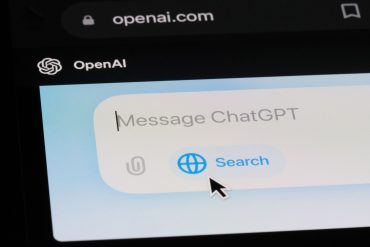
- AI
ChatGPT Pilots Gmail Integration for Email and Scheduling
6 minute read

ChatGPT’s Gmail integration enables AI-powered email analysis and scheduling tools for enterprise workflow automation
Three Key Facts
- ChatGPT tests Gmail and Google Calendar integration to enable direct email summarization, response drafting, and calendar event creation within the AI platform
- Google launches competing Gemini AI feature that automatically detects event content in emails and adds calendar events, rolling out to select Workspace subscribers through mid-April 2025
- AI productivity software market projected to reach $126 billion by 2025 as companies compete for enterprise workflow automation dominance
Introduction
OpenAI advances its productivity strategy with ChatGPT testing new Gmail and Google Calendar integrations that allow users to summarize emails and create calendar events directly within the AI platform. The development signals a major push into enterprise workflow automation as OpenAI seeks to position ChatGPT as an indispensable business tool.
AI researcher Tibor spotted the feature during testing, revealing ChatGPT’s expanded capabilities to analyze emails, draft responses, and organize schedules from a single interface. The integration represents a significant evolution from ChatGPT’s current Gmail support, which operates primarily through Deep Research without direct email summarization capabilities.
Key Developments
ChatGPT currently supports limited Gmail functionality through its Deep Research feature but lacks direct email summarization from Gmail accounts. The new integration testing expands these capabilities to include comprehensive email analysis, automated response generation, and seamless calendar management.
OpenAI appears to be connecting this functionality with its ChatGPT Search function, based on FAQ page references discovered during the testing phase. The company anticipates an official announcement regarding the Gmail and Calendar integration in the coming days.
Google simultaneously launches its own competing feature powered by Gemini AI, which automatically detects event-related content in emails and presents an “Add to calendar” button. This Google feature streamlines meeting organization by allowing users to add events to Google Calendar directly from email content, though it remains limited to English language use on web platforms.
Market Impact
The integration intensifies competition in the AI productivity sector, where Microsoft Copilot and Google’s own AI tools compete for enterprise market share. OpenAI’s move to integrate with Google’s widely-used productivity suite positions ChatGPT to capture business users seeking comprehensive workflow automation.
Enterprise demand for AI-driven productivity tools drives significant market growth, with studies indicating that automation can reduce manual email and scheduling workloads by up to 40%. This efficiency gain creates substantial monetization opportunities for premium ChatGPT subscriptions targeting business users.
The development affects user acquisition costs and platform alliances as OpenAI navigates its relationship with Google while competing directly with Microsoft’s productivity-focused AI offerings. Market observers closely watch how these competitive dynamics influence licensing agreements and feature development priorities.
Strategic Insights
OpenAI’s strategy centers on embedding ChatGPT deeper into daily professional workflows, increasing user engagement and platform stickiness. By connecting with essential Google services, the company transforms ChatGPT from a standalone AI tool into a central productivity hub that handles multiple business functions.
The integration enables enhanced personalization through access to user emails and schedules, allowing ChatGPT to provide tailored assistance including smart scheduling suggestions and context-aware reminders. This data-driven approach differentiates ChatGPT from generic digital assistants and creates competitive advantages in enterprise settings.
Third-party automation platforms like Latenode and Integrately benefit from increased demand for ChatGPT integrations, offering no-code solutions for businesses seeking custom workflow automation. These platforms provide alternatives for companies requiring specific integration capabilities beyond standard offerings.
Expert Opinions and Data
Industry professionals express strong enthusiasm about productivity gains from automated email and scheduling integration. Business leaders view the development as a significant advancement in workplace efficiency, particularly for organizations managing high volumes of communications and meetings.
Privacy experts caution that deeper integration with sensitive platforms like Gmail and Calendar creates new security challenges requiring robust safeguards and transparent data handling policies. BleepingComputer reports that OpenAI must address these concerns to maintain user trust as AI capabilities expand.
Market analysts consider this development a significant escalation in the AI productivity race, with OpenAI seeking to match or surpass Microsoft and Google’s own AI offerings. Successful execution could cement ChatGPT’s role as a central digital work hub, while privacy or reliability issues could invite regulatory scrutiny.
The global AI productivity software market’s projected growth to $126 billion by 2025 underscores the commercial importance of these integrations. Companies investing in comprehensive AI workflow automation position themselves advantageously in the expanding enterprise software market.
Conclusion
OpenAI’s Gmail and Google Calendar integration testing represents a strategic expansion into enterprise productivity automation that could reshape how businesses handle routine communications and scheduling. The development positions ChatGPT as a comprehensive workflow management platform while intensifying competition with Microsoft Copilot and Google’s own AI tools.
The integration’s success depends on OpenAI’s ability to deliver reliable functionality while addressing privacy concerns and maintaining user trust. As AI assistants handle increasingly complex and sensitive business tasks, the balance between automation benefits and data security considerations becomes critical for widespread enterprise adoption.







